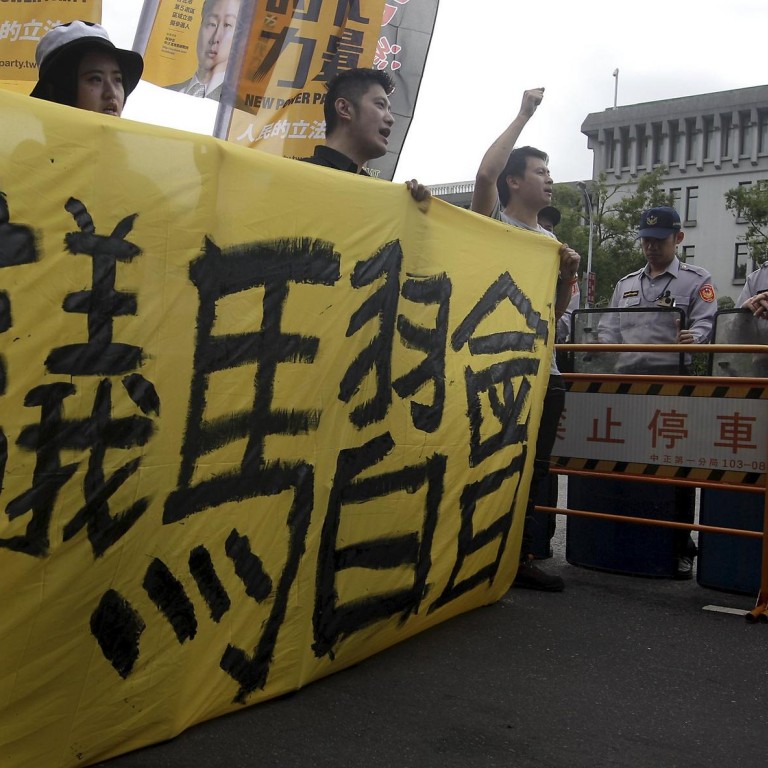
New | Landmark meeting between leaders of mainland China and Taiwan leaves island's ruling KMT party with an electoral puzzle
Landmark meeting may boost cross-strait ties, but is unlikely to enhance the party's election hopes
The first meeting in 66 years between the leaders of mainland China and Taiwan will do little to change the grim prospects of the island's ruling Kuomintang ahead of presidential and legislative elections in January, analysts believe - but it could hasten the party's decline.
With the island's elections on January 16 fast approaching, the Taiwanese opposition Democratic Progressive Party (DPP) on Wednesday questioned the motives behind the scheduling of the landmark meeting in Singapore of the mainland's President Xi Jinping and Taiwan's President Ma Ying-jeou on Saturday.
READ MORE: 'Mister' sets the stage for historic talk between mainland China's Xi Jinping and Taiwan's Ma Ying-jeou in Singapore
But analysts say the meeting is unlikely to reverse the fortunes of the struggling KMT in the elections, with the latest polls showing the party's presidential candidate Eric Chu has only about 20 per cent of the vote.
The polls show the DPP's Tsai Ing-wen - widely tipped to become Taiwan's first female president - to be leading by a large margin of more than 40 per cent. James Soong, of People First, has about 15 per cent, according to polls last month in Taiwanese media.
Lin Chong-pin, former vice-chairman of Taiwan's Mainland Affairs Council [MAC], said the summit might increase uncertainty surrounding the election.
"If Taiwanese feel that Ma's presentation at the summit is poor, its impact might be worse than the Sunflower movement last year," Lin said.
He was referring to the student-led movement to occupy Taiwan's legislature for about a month from mid-March last year in protest against a trade agreement with the mainland.
Lin said anti-Beijing sentiment among many young Taiwanese had soared since then because the cross-strait trade agreement benefited only KMT-owned enterprises and families with close links to the ruling party.
"It may accelerate the decline of the KMT and force further splits," Lin added.
A survey by the National Chengchi University in June showed 60 per cent of people on the island identified themselves as Taiwanese, while only 3 per cent said they were Chinese. More than 10 per cent of respondents had shifted from recognising themselves as both Chinese and Taiwanese to only Taiwanese since Ma was elected as president in 2008.
READ MORE: From civil war to civil greetings: Why President Xi Jinping’s meeting with Taiwan’s President Ma Ying-jeou is so significant
Professor Wang Yeh-lih, a political scientist from National Taiwan University, said even if the meeting went well, it would only help the KMT earn the support of some swing voters, who make up only a small part of the electorate.
Andrew Hsia Li-yan, head of Taiwan's MAC, said yesterday that the council had not considered the January elections when negotiating the visit with mainland authorities.
"We never considered [the meeting] would influence the election at all, we just believed that the time was ripe," Hsia said, adding that it was aimed at enhancing the cross-strait relationship and keeping it on a long-term path of peaceful development.
The meeting is the first by the top leaders of the two sides since the Kuomintang fled to Taiwan in 1949 amid a civil war. Its sudden announcement at midnight on Tuesday surprised many Taiwanese, with some opposition supporters saying the talks amounted to a betrayal.
Some critics on social media went further, saying any future meeting between the two leaders would be "a handshake of death".
The pro-DPP heavily criticised Ma's decision to meet Xi, while other KMT newspapers were more positive.
A few members of the pro-independence Free Taiwan Party gathered outside the legislature yesterday morning to protest.
Tsai, the DPP chairwoman, said the meeting was harmful for Taiwan's democracy.
"Our people will never allow President Ma to interfere in the future of Taiwan for his own political purpose as his presidency approaches its end. He doesn't have authority to promise things he cannot take responsibility for."

